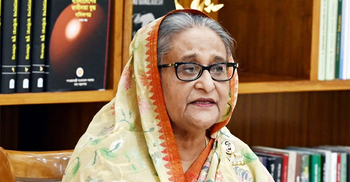Israel elections: Netanyahu in lead, exit polls say

Former Israeli Prime Minister Benjamin Netanyahu is on course for victory in Tuesday's elections, according to exit polls.
The polls, which forecast the outcome before official results, give his right-wing bloc a slim majority of seats over his opponents, reports BBC.
Such a result would mark a dramatic comeback for Mr Netanyahu, toppled last year after 12 straight years in power.
"We are close to a big victory," he told his supporters in Jerusalem.
The election was widely seen as a vote for or against Mr Netanyahu's return.
Official results, which could still produce a different outcome, are expected in the coming hours.
His main rival, current Prime Minister Yair Lapid, said "nothing" was yet decided.
But as the polls were announced at 22:00 (20:00 GMT), upbeat music burst from loud speakers at the central venue of Mr Netanyahu's Likud party in Jerusalem.
Mr Netanyahu, 73, is one of Israel's most controversial political figures, loathed by many on the centre and left but adored by Likud's grassroots supporters.
He is a firm supporter of Israel's settlement-building project in the West Bank, occupied since the 1967 Middle East war. Settlements there are considered illegal under international law, though Israel disputes this.
He opposes the creation of a Palestinian state in the West Bank and Gaza Strip as a solution to the Israel-Palestinian conflict - a formula supported by most of the international community, including the Biden administration in the US.
Mr Netanyahu is also currently on trial for alleged bribery, fraud and breach of trust - charges he fiercely denies. His possible partners in a Likud-led coalition government have said they would reform the law, in a move which would bring a halt to his trial.
Israel TV exit polls suggest Mr Netanyahu's bloc will command 61 or 62 seats in the 120-seat knesset (parliament).
"It looks like we can be optimistic and have some hope we are about to get a stable coalition with Bibi [Mr Netanyahu] as the prime minister," said 34-year-old Likud supporter David Adler, from Jerusalem.
"But as it's been in the past three years, nothing is sure until the coalition is set up," he cautioned.
According to the polls, Likud stands to be the biggest party, with 30-31 seats, commanding a majority with the support of nationalist and religious parties.
The centre-left party of incumbent Prime Minister Yair Lapid, who brought down Mr Netanyahu in elections last year, is forecast to win 22-24 seats.
Likud's ultra-nationalist ally Religious Zionism appears to have won 14 seats, which would make it the third largest party. Its leaders have gained notoriety for using anti-Arab rhetoric and advocating the deportation of "disloyal" politicians or civilians.
"It will be better now," said Religious Zionism supporter, Julian, at the party's venue in Jerusalem. "When [Religious Zionism politician Itamar Ben-Gvir] will be minister of public security, it will be even better - he'll bring back security to the people of Israel. That's very important."
However, political scientist Gayil Talshir, from the Hebrew University of Jerusalem, warned that if the exit polls "reflect the real results, Israel is on its way to become Orban's Hungary", recently branded an "electoral autocracy" by the EU.
If the polls are confirmed, it will stave off the prospect of a sixth election in just four years after analysts predicted deadlock.
It would mark a remarkable turnaround for Mr Netanyahu, whose political future was widely written off after Mr Lapid formed an unlikely alliance of ideologically diverse parties to take power in June 2021.
At the time, Mr Netanyahu vowed to bring it down as quickly as possible. He engineered its collapse after just 12 months.







